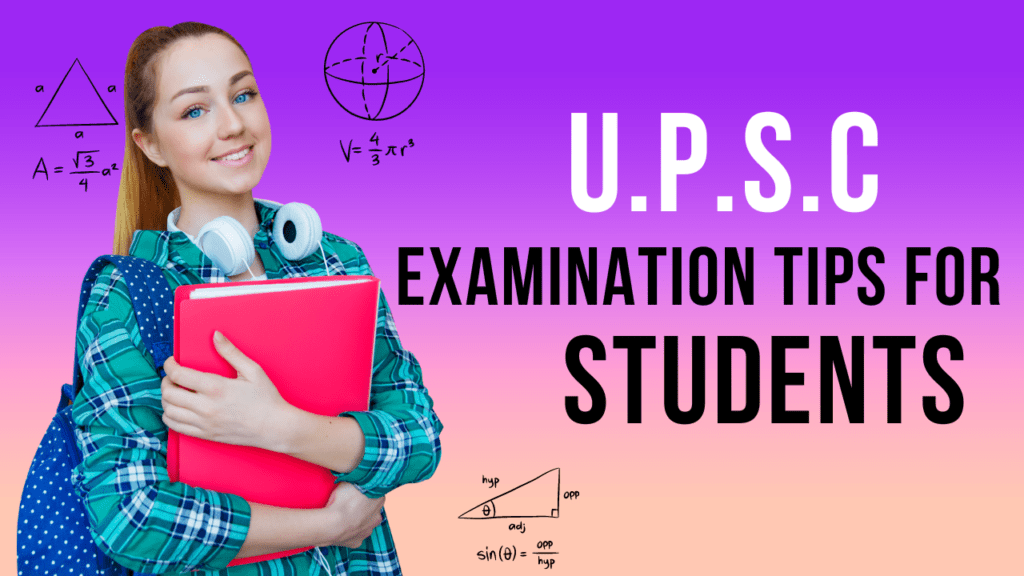How to Crack the UPSC Examination
One of the most prominent and difficult tests in India is the Union Public Service Commission (UPSC) exam.It is a gateway to a career in the Indian Administrative Service (IAS), Indian Police Service (IPS), Indian Foreign Service (IFS), and other central services. Preparing for this examination requires a strategic approach, dedication, and perseverance. This article aims to provide you with comprehensive guidance on how to crack the UPSC examination, including tips, resources, and success stories.

Education Tips to Crack UPSC Examination
Here are seven essential tips to help you crack the UPSC examination:
- Understand the UPSC Syllabus Thoroughly
- Create a Realistic Study Plan
- Read Standard Reference Books
- Stay Updated with Current Affairs
- Practice Answer Writing
- Take Mock Tests Regularly
- Stay Consistent and Motivated
1. Understand the UPSC Syllabus Thoroughly
The first step of getting ready for the UPSC examination is to understand the syllabus in detail. The syllabus for the UPSC Civil Services Examination is vast, covering a wide range of subjects. Here’s a detailed breakdown:
Preliminary Examination
- General Studies Paper I:
- Current events of national and international importance.
- History of India and Indian National Movement.
- Indian and World Geography – Physical, Social, Economic Geography of India and the World.
- Indian Polity and Governance: Public Policy, Rights Issues, Panchayati Raj, Political System, and Constitution, etc.
- Economic and Social Development – Sustainable Development, Poverty, Inclusion, Demographics, Social Sector Initiatives, etc.
- General issues on Environmental Ecology, Climate change and biodiversity are two things that do not require subject specialization.
- General Science.
- General Studies Paper II (CSAT):
- Comprehension.
- Interpersonal skills including communication skills.
- Logical reasoning and analytical ability.
- Decision-making and problem-solving.
- General mental ability.
- Basic numeracy (numbers and their relations, orders of magnitude, etc.) (Class X level), Data interpretation (charts, graphs, tables, data sufficiency, etc. – Class X level).
Main Examination
- Paper A: (One of the Indian languages listed in the Eighth Schedule to the Constitution, to be chosen by the candidate).
- Paper B: English.
- Paper I: Essay.
- Paper II: General Studies I: History, Global Geography, Indian Heritage and Culture, and Society.
- Paper III: General Studies II – Governance, Constitution, Polity, Social Justice and International relations.
- Paper IV: General Studies III – Technology, Economic Development, Bio-diversity, Environment, Security, and Disaster Management.
- Paper V: General Studies IV – Ethics, Integrity, and Aptitude.
- Paper VI: Optional Subject Paper 1.
- Paper VII: Optional Subject Paper 2.
For a detailed syllabus, you can refer to the official UPSC website: UPSC Syllabus
2. Create a Realistic Study Plan
Creating a study plan that suits your schedule and adheres to the exam timeline is crucial. Here’s how to arrange your study timing:
Daily Targets: Break down the syllabus into daily targets to make your preparation manageable.
- Weekly Reviews: Assess your progress weekly to stay on track.
- Revision Time: Allocate time for regular revisions to reinforce your learning.
- Flexibility: Build in some flexibility to adjust for unforeseen circumstances.
3. Read Standard Reference Books
Standard reference books are essential for building a strong foundation. Here are some recommended books for different subjects:
- History:
- Bipan Chandra – India’s Struggle for Independence
- Rajiv Ahir – A Brief History of Modern India
- Geography:
- Goh – Certificate Physical and Human Geography
- Cheng Leong
- Oxford School Atlas by Oxford
- Polity:
- Indian Polity by M. Laxmikanth
- Economics:
- Indian Economy by Ramesh Singh
- Environment:
- Environment by Shankar IAS Academy
- Current Affairs:
- The Hindu newspaper
- Yojana magazine
- Kurukshetra magazine
4. Stay Updated with Current Affairs
Current affairs play a significant role in both the Preliminary and Main examinations. Here’s how you can stay updated:
- Newspapers: Start reading The Indian Express or The Hindu every day.
- Magazines: Subscribe to Yojana, Kurukshetra, and EPW.
- Online Resources: Follow reliable websites like PIB, PRS, and government portals.
- Notes: Make concise notes of important events, which will help during revision.
5. Practice Answer Writing
Writing answers is a crucial UPSC Mains ability. Practice on a frequent basis to enhance your capacity to express yourself clearly and concisely. Here are some tips:
- Start Early: Begin practicing answer writing as soon as you start your preparation.
- Timed Sessions: Write answers within a stipulated time to simulate exam conditions.
- Peer Reviews: Exchange answers with peers for feedback.
- Mentorship: Consider joining a test series for professional feedback.
6. Take Mock Tests Regularly
Mock tests are essential to assess your preparation and improve your performance. They help you get accustomed to the exam pattern and manage time effectively. Here’s how you can incorporate mock tests into your preparation:
- Frequency: Take one mock test every week initially, increasing the frequency as the exam approaches.
- Analysis: Examine your performance to determine your advantages and disadvantages.
- Improvement: Work on the areas where you scored less in the mock tests.
7. Stay Consistent and Motivated
Consistency and motivation are key to cracking the UPSC examination. Here are some tips to stay motivated:
- Set Goals: Set short-term and long-term goals to keep yourself focused.
- Take Breaks: In order to prevent burnout, regular breaks are necessary.
- Exercise: Regular physical activity helps in maintaining mental and physical health.
- Support System: Stay connected with family and friends who can support and encourage you.
Tables for Reference
UPSC Previous Years Important Questions
| Year | Subject | Question |
| 2023 | History | Discuss the impact of the Non-Cooperation Movement on the Indian freedom struggle. |
| 2022 | Geography | Explain the factors responsible for the formation of Indian monsoon. |
| 2021 | Polity | Evaluate the role of the President in the Indian parliamentary system. |
| 2020 | Economics | Analyze the implications of GST on the Indian economy. |
| 2019 | Environment | What are the major causes and consequences of climate change? |
Tips and Success Stories of UPSC Toppers
| Name | Rank | Year | Tips and Strategies |
| Anudeep Durishetty | 1 | 2017 | Focus on NCERTs, regular revision, and mock tests. |
| Tina Dabi | 1 | 2015 | Consistent study schedule, thorough understanding of polity and economics. |
| Ira Singhal | 1 | 2014 | Importance of current affairs, balanced preparation across subjects. |
| Gaurav Agarwal | 1 | 2013 | Strategic planning, emphasis on optional subjects, and essay practice. |
Frequently Asked Questions (FAQs)
Key Takeaways
- Understand the syllabus: Thorough knowledge of the syllabus is essential for focused preparation.
- Structured study plan: A realistic and flexible study plan helps in systematic preparation.
- Standard resources: Use recommended books and stay updated with current affairs.
- Practice regularly: Answer writing and mock tests are crucial for success.
- Stay motivated: Consistency and a positive mindset are key to overcoming challenges.
Cracking the UPSC examination is a journey that demands dedication, hard work, and strategic planning. By following these tips and utilizing the recommended resources, you can enhance your chances of success. Stay focused, believe in yourself, and keep pushing forward. Good luck!
